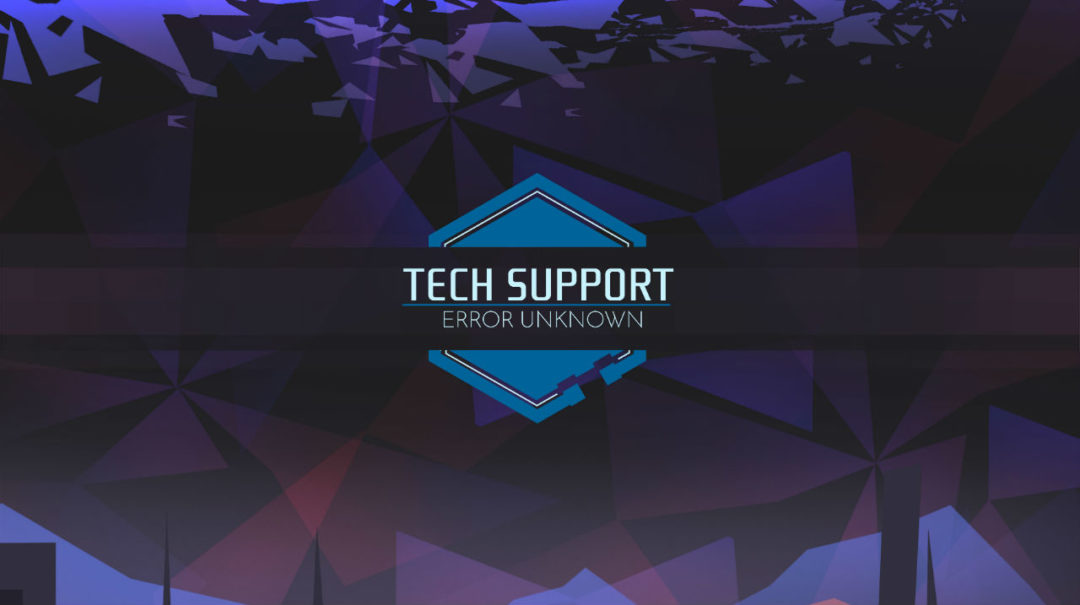[This week, Escapist is sponsored by Tech Support: Error Unknown, available now for Steam. Here’s a word from our sponsor.]
You never know how people are going to react when you release a game. The product of months and years of work decisions leading to a single piece, and it boils down to that moment when you press the button and set it out into the world. Will the players enjoy it, hate it, be angry, elated … Some games can even be life changing. My newest game, Tech Support: Error Unknown, is all about those personal interactions, and how people react to your decisions.
You’re a new starter at a big multi-national corporation, using automated chat software to communicate with colleagues and customers. Support interactions start off simply enough— ask them to turn their device off and on, change a setting or put your device in some rice overnight — the usual. But as the game continues, the conversations become deeper, involving personal dilemmas and tough choices which will change everything.
I’m launching Tech Support: Error Unknown two years after the release of Arelite Core, my first commercial game. It took me 4 1/2 years to complete, doing all of the programming and design, contracting artists to make the graphics and sounds — all while still working full-time as a web programmer. It’s easy to underestimate the amount of time a project like this can take, and I certainly did. Developing a game is always a lot of work and sacrifices, and doing it alone while balancing a full time job even more so. I sacrificed time with my family and friends and had little time to play other games. For those four years, my routine became going to my 8 to 5, getting back home and crunching on the project until it was done.
My name is Kevin Giguere. I am a 36-year-old Canadian with a college degree in computer sciences and 14 years of professional experience. I worked with web applications for most of my life, but had a three year stint as a flash game programmer in the mid-2000s. Until starting development of my first indie title, I had never worked as a project manager and never developed a game on my own.
Like many others in my position, I wanted to make game development the next step in my career. I knew how difficult it could be, building a business always is, but I was willing to do what it took to get there successfully. I kept my expenses low, cumulating a financial cushion and then — I left my job. Arelite Core came out just a month later, by which time I was about two months into my next project, Astral Traveler. When your salary depends on the games you’re making, you have to keep the ball rolling and always have a project moving forward.
These first two games taught me a lot about the process, much of which had not turned up during my research on other indie developers. For Arelite Core, I had decided to code the engine myself during C# and XNA, which unfortunately became a time consuming affair which never paid off. Subsequent games used Unity instead, which allowed me to better focus on their actual design. It can accommodate 2D, 3D and UI experiences, and has a many assets available online and clear tutorials when issues come around.
I also recognized, though unfortunately too late, how much of a struggle marketing games can be. We are set up against thousands of other games each year, some with millions of dollars to proclaim them the next best thing. Astral Traveler was drowned out by all the other developers promoting their game.
To avoid marketing issues with my next project, I knew that I would want a publisher to help me tackle those tasks. After sending out over a hundred emails, I met the team at Iceberg Interactive. We chatted over Skype and I felt I had a good rapport with them. I was confident they would put in enough time and resources to really allow me to take my games to a new level. Beyond the marketing support, they also offered testing and localization, which helped broaden our audience.
I love game design in general, the ability to take a context and apply a set of rules to make it as engaging and fun as possible. I also love to challenge expectations by choosing unexpected themes or contexts, or blending genres. I often find myself looking at mundane moments in life and trying to imagine converting it into a fun game. As I considered ideas for my next project I became intrigued by a concept about technical support. What kind of engaging story can I tell? How can I make that game evolve throughout the gameplay? I believe everything can be converted into a game people can enjoy, so I just had to find the correct angle. I found it with Tech Support: Error Unknown, although the journey to get there wasn’t what I thought it would be …
Tech Support: Error Unknown is available now on Steam for Windows, Mac and Linux. This is the start of a 2-part — read Part 2 coming soon.





Published: Feb 28, 2019 03:30 pm